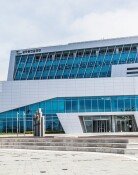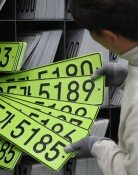President’s abuse of right to pardon
President’s abuse of right to pardon
Posted November. 25, 2017 08:34,
Updated November. 25, 2017 08:55
The Ministry of Justice of South Korea instructed the prosecutors’ offices nationwide on Wednesday to review of giving a special pardon to all of the inmates who have received criminal punishment for being involved in a political assembly. The justice ministry has specifically called out five political rallies for the Jeju naval base, the Miryang transmission tower, the Yongsan fire incident, the deployment of Terminal High Altitude Area Defense (THAAD) system and the sinking of the Sewol ferry. Typically, the justice ministry starts the pardon process and chooses to whom it will issue a pardon in accordance with the presidential office’s guidance. In other words, the ministry has started to gather information about names and the number of the prisoners on the database who can be pardoned by the presidential office Cheong Wa Dae.
These five political rallies, specifically mentioned by the justice ministry, have been blamed for having been evolved into an illegal and violent protest after professional protestors, who prompt a riot nationwide, joined the rally. For example, outside protestors across the nation joined the protest against the Jeju naval base and they assaulted police officers and damaged public installations, making the scene all the more aggressive and violent. Among about 800 groups partnered with the People’s Committee for the Sewol ferry tragedy were many groups of people who marched against the government and led the candlelight demonstrations over the mad cow disease in 2008 and those who orchestrated the anti-government movement right after former President Park Geun-hye began her term. Park Rae-gun, the co-chairman of the committee, previously led the protest against the U.S. military base in Pyeongtaek and the Jeju naval base. Granting a pardon to people who moved from place to place where social issues exist and heightened the tension is no different from encouraging illegal activities.
Giving a pardon to pro-North Korea groups can become a controversial issue. The anti-THAAD national campaign has been led by about 50 groups and some of them are professional protestors who led the Jeju naval base protest, the People’s United Party, which is a successor of the United Progressive Party that had been disbanded forcefully by the government, the Korea Solidarity and the National Alliance for the Country's Reunification’s division in the South, which were stated as pro-North Korea groups by the court,. In addition, the People’s United Party has openly requested for a release of Lee Seok-ki, former lawmaker of the United Progressive Party, to Choo Mi-ae, the head of the ruling Minjoo Party. Another controversial issue will be the release of Korean Confederation of Trade Unions President Han Sang-gyun, who has been in prison with charges of instigation of a riot on the anniversary of the sinking of the Sewol ferry.
Back in August 2015, Moon Jae-in, the then-head of the New Politics Alliance for Democracy, highlighted the “importance of a pardon for harmony with the vulnerable” by referring to the Jeju naval base and the Yongsan fire incident when special pardons were given on the National Liberation Day by the former administration. But now, President Moon's perspective should be different than the perspective of the head of an opposition party. The entire public should come first over gartering of supporters. Not many people will see professional protestors as the vulnerable and think turning a blind eye to their illegal activities will help enhance harmony of South Korean society. Though giving a pardon is the president’s sole privilege, its execution should be limited as it is considered a major exception to the national jurisdiction. Giving a pardon to all protestors of a political rally has never been seen or heard. If the president abuses the right to pardon, it is another presentation of “corruptive connections.”
Headline News
- N. Korea launches cyberattacks on S. Korea's defense companies
- Major university hospital professors consider a day off each week
- Italy suffers from fiscal deficits from ‘Super Bonus’ scheme
- Inter Milan secures 20th Serie A title, surpassing AC Milan
- Ruling and opposition prioritize spending amid tax revenue shortfalls







